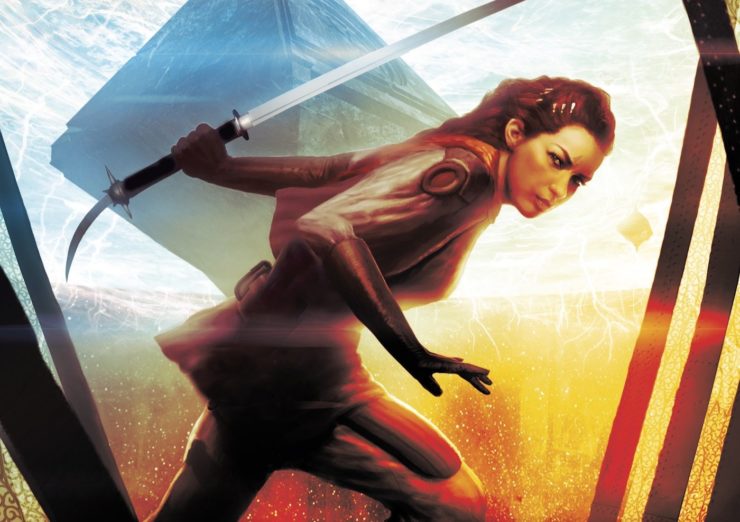Earlier this week, word broke that Game of Thrones creators David Benioff and D.B. Weiss left their Star Wars project with Lucasfilm, seemingly over their split duties between that and their recent overall deal with Netflix. Now, a pair of reports point to tensions between the pair and LFL, and indicated that their new trilogy project would have been about the origins of the Jedi.
Variety published a lengthy post about the tensions between the pair and Lucasfilm, noting that they had been promised some measure of creative control over their trilogy. The pair reportedly “had ambitious plans to take the Star Wars universe in a new direction, one that would exist apart from the Skywalker family saga that comprised the franchise’s centerpiece nine-film series,” Variety says. Notably, the pair were “interested in exploring was how the Jedi came to exist. However, Lucasfilm executives and the creators begin to see their visions for the films diverge during meetings last summer.”
Meanwhile, The Hollywood Reporter notes that “Benioff and Weiss’ exit has been brewing since August. Lucasfilm chief Kathleen Kennedy is said to have been unhappy with the Netflix deal, inked just as they were scheduled to being work on Star Wars.”
The origins of the Jedi are a huge jump away from where the Skywalker saga sits in the franchise’s overall chronology, potentially tens of thousands of years in the past. It’s territory that Lucasfilm has explored before, however, and one common refrain from fans whenever a new project is announced is that an adaptation of Knights of the Old Republic should be adapted as a film.
It’s not hard to see why: set 4000 years prior to the events of the main franchise, the game allowed players to fight against a Sith Lord named Darth Malak as he unleashed a massive attack against the Old Republic. The 2003 roleplaying game earned considerable acclaim from reviewers and players for the scale of its story, and it’s remained a beloved classic amongst fans.
Lucasfilm has over the years delved even deeper with the franchise’s earliest history. Kevin J. Anderson and Tom Veitch penned their Tales of the Jedi comic series in 1993, setting up a story about a cataclysmic war between the Jedi and Sith set 4,000 years prior to A New Hope, while Tim Lebbon’s 2013 novel Dawn of the Jedi: Into the Void and Jan Duursema / John Ostrander’s Dawn of the Jedi: The Prisoner of Bogan comic series were set a whopping 25,793 years before the first film. KOTOR provided plenty of tie-in novels.
When Disney acquired Lucasfilm in 2012, those stories were rendered non-canon to free up any constraints on J.J. Abrams and other filmmakers. That left plenty of fertile ground for authors and artists to rebuild the story. Notably, Lucasfilm has focused on the gap between Return of the Jedi and The Force Awakens with books such as Chuck Wendig’s Aftermath trilogy, Claudia Gray’s Bloodline, Delilah S. Dawson’s Phasma, and others. But the franchise’s deep history remains untouched, presumably to allow for some freedom of movement for future film directors.
https://reactormag.com/2016/05/04/star-wars-bloodline-should-definitely-be-a-movie/
Since 2012, Lucasfilm and Disney have had some huge ambitions for the Star Wars franchise, but what’s emerged since then is a story of a clash between Lucasfilm’s desire to hold tightly onto its story and canon, and the creative freedom that it gives directors. Benioff and Weiss became the latest set of directors to depart the franchise, following in the now well-trod path left by Phil Lord and Chris Miller (Solo), Josh Trank (Boba Fett standalone), Colin Trevorrow (Episode IX), and Gareth Edwards (Rogue One).
The story has remained fairly consistent: creative differences between what Lucasfilm wants and what the directors want. It’s easy to see why there might be some clashes between the two groups when it comes to a story that’s set thousands of years prior to the films that we’re already familiar with: any story would be distantly removed from the Skywalker Saga, but would presumably carry with it some impact on how the world came to be. Figuring out the right story and characters is a tall order.
Furthermore, the era comes loaded with the expectations of fans. The desire for a specific adaptation means that fans want a specific thing, something that Lucasfilm will be intrinsically unable to deliver — no adaptation of KOTOR will match the image that exists in the minds of fans, and straying too far from the concept will undoubtably bring howls of pain from certain quarters of the internet.
At the end of the day, it seems as though there was just too much sand in the gears: between the huge deal with Netflix and diverging visions for what the next big Star Wars franchise should be, it seems as though Lucasfilm is starting over. They certainly have plenty of material to work with — Kevin Feige is developing a Star Wars film, The Last Jedi director Rian Johnson is working on a trilogy of his own, and the company has a handful of Star Wars TV projects in the works. And, it seems that LFL is looking to bring in new writers — Variety says that it’s “begun taking general meetings with other writers,” presumably to start and figure out what the next steps for the future of Star Wars looks like.










